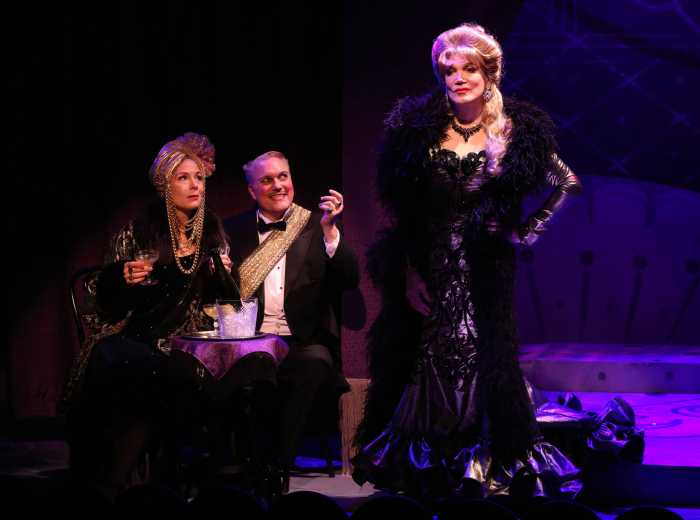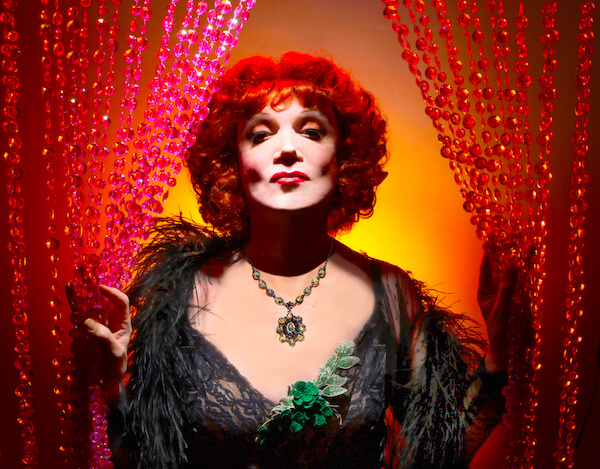Julie Halston in the Papermill Playhouse production of “Ever After.” | JERRY DALIA/ PAPERMILL PLAYHOUSE
BY DAVID NOH | That absolute goddess of a character actress Julie Halston is having quite the year. After demolishing both audiences and admiring critics with the most hilarious cameo appearance ever in “You Can’t Take It with You,” she immediately went into “On the Town” for a short stint replacing Jackie Hoffman, and is now appearing in the Papermill Playhouse production of the new Cinderella-inspired musical “Ever After,” based on the 1998 Disney film (Millburn, New Jersey, through June 21; papermill.org).
So funny and Eve Arden-esque, both on and off the stage, Halston exultantly described her new show: “I’ve never played the Papermill, but this is a very exciting, brand new musical. I’ve known [composer and lyricist] Zina Goldrich and Marcy Heisler since my 1980s club days, and it’s really exciting to hear such a beautiful Broadway score. I play Queen Marie, the Prince’s mother, and like many mothers, she gets exasperated with her children and husband and only wants the best for everyone. It allows me to wear gorgeous costumes — ‘Wolf Hall’ meets ‘Camelot’ — by Jess Goldstein, who just won the Irene Sharaff Award, and be a little droll but also very nice. I have a headdress that rivals Sarah Jessica Parker at the Met Gala, but I get to do a court dance!”
Full of praise for director Kathleen Marshall, Halston also adores her cast — Christine Ebersole, Margo Seibert, Tony Sheldon, Charles Shaughnessy, James Snyder — and generously cited each of their wonderful qualities: “They sing, dance, act, and sword fight! I hate to sound like Bea Arthur, but these kids today are very talented!”
Julie Halston’s fabulous year; a gay geezer sings of Pride
Of her Outer Critics Circle and Drama Desk-nominated turn in “You Can’t Take It With You,” Halston said, “In the history of show business, the only shorter performance that actually won an Oscar was Beatrice Straight in ‘Network,’ and she was on screen for about eight minutes. I am only in Act Two, half the time sleeping [off a drunk], for maybe 20 minutes. [Director] Scott Ellis gave me such freedom, saying, ‘Figure out what you wanna do,’ and he gave me one night in front of an audience. I came up with my character drunkenly crawling up those stairs but I really didn’t know I was going to do that five days before the critics came. That night I said to the cast, ‘I don’t know what I’m gonna do tonight but please bear with me and follow me.’
“When I dropped to my knees, Rose Byrne started laughing and had to turn away from the audience. I heard her laughing, she was a crack-up, anyway, and then I saw the whole cast laughing, which got the giggles in me. That helped fuel the whole drunk, giggly limerick, and the audience was screaming! It was exactly what was called for, and Scott said, ‘Okay, that’s what you’re gonna do!’ Besides those nominations, my darling Brad Oscar of ‘Something Rotten’ and I are getting the [Actors’ Equity] Richard Seff Award, which is given annually to veteran character actors for their performances.”
Jackie Hoffman had hurt her foot and was unable to walk, let alone perform in “On the Town,” and Halston got the call for that gig while waiting in line on a Saturday night at Whole Foods: “And you know how long the line can be! I was back in produce when I get a call from both my manager and my agent. ‘Get off the line!,’ they said. ‘This better be good!’ I got off that damn line and I was very unhappy, believe me. They said, ‘Can you go see ‘On the Town’ tonight?’ ‘What? It’s 7 o’clock!’
“[Director] John Rando knew I was available and had asked for me. Jackie is a friend of mine and she was particularly miserable because not only was she not in the show, she couldn’t walk at all and was in pain, and could only tweet, poor thing, as Eve Harrington went on for her. I went in and rehearsed Monday and Tuesday, watched the show on Wednesday and did it Thursday. It was crazy but I would watch those dancers from the wings every night and I would just cry to hear that music. When the boys go ‘New York! New York!’, it was all my dreams come true.”
A kind of rough sketch for her performance in “You Can’t Take It with You” was her now-definitive Electra, the illuminated but rather ossified stripper, in the 2003 Bernadette Peters revival of “Gypsy.” Recalling that people have come up to her on the subway and said, “I still remember your Electra not being able to stand straight on stage,” Halston said, “That thrills me because [director] Sam Mendes literally pulled me into a corner and said, ‘I’m listening to the lyrics of this song: “I’m electrifying and I’m not even trying.” I know this is hard but I am begging you, don’t move.’ I was like, ‘But, wow, it’s a fabled musical number, one the great showstoppers of all time!’
“Sam said, ‘We have decided that Miss Electra is a red wine drunk’ — I love that I always play drunk, a little scary — ‘If you don’t move, this number will take on such hilarity, you have to trust me.’ Well, duh. The result was unbelievable. He was right and what a great choice. It had never been done before and apparently now it’s being done that way everywhere.
I asked Halston what the show’s famously redoubtable author, Arthur Laurents, was like. “Arthur was very cranky about a million things he wanted changed. But he came to see me years later in Charles Busch’s ‘The Divine Sister,’ and he laughed so much. He met us after the show and he loved me and he said, ‘Hello, Cunt-face!’[Laughs.]
“It made me feel so great. He was famously cranky about the Bernadette revival, and he and Sam had some tension there. He was very happy with what I was doing but in general not happy with the production. I was really happy to see him again, especially when he said, ‘You are really so funny, Julie.’ I got Arthur Laurents’ sort of blessing, he loved ‘The Divine Sister,’ and why wouldn’t he, because it was brilliant.”
Halston is gloriously in the tradition of the great character women of classic Hollywood — Thelma Ritter, Florence Bates, Edna May Oliver — and I asked her how she felt about this. “When I watch TCM, it’s funny, when Robert Osborne talks about those ladies I do feel part of that tradition and it’s very humbling and also energizing. Those women definitely brought a lot of joy, and they were part of a tradition that we don’t really have as much anymore. And so I really appreciate someone like Charles Busch, who totally understands this tradition, made a phenomenal career in honoring that, and saw something in me that made him think, ‘I can get this girl to that place,’ and he did. I’ve learned so much in my 25 to 30 years in this business, and I’m very grateful. It’s about mastering a real craft of a particular type that has very deep roots in vaudeville and film and theater.”
Halston mentioned actors as disparate as Bogart, Lombard, Stanwyck, ZaSu Pitts, Charlotte Greenwood, and Michelle Williams as inspirations, but added, “My favorite person in the whole world is little Edie Beale. I’ve watched the ‘Grey Gardens’ movies 19 times and [launching into a hilarious Edie voice] I daresay, David, she’s more compelling than any of them. Actually, Charles and I have talked about doing our own version. He would be Big Edie, as he’s got the screaming down. I think it might actually happen, David, one of these days, our own version. I should do it for Christine [Ebersole], and, of course, it would be really marvelous.”
When I told Halston of my personal theory that all relationships inescapably end up as “Grey Gardens,” she responded, “And then there’s my mother who is almost 91, and don’t think when I go out to Commack, Long Island, that we are not reenacting scenes from that all the time!”
Ira Lee Collings, the self-proclaimed gay geezer. | SCHULMAN PUBLICITY
Artistic yearnings of some kind or another exist in most of us, but success is an elusive thing and few make the cut into stardom or even semi-stardom. So, in this month of Gay Pride, let’s hear it for someone who’s managed to keep his performance love alive, even without any rich-and-famous perks. Seventy-nine-year-old Ira Lee Collings is bringing his show, “Gay since 1935 — A Gay Geezer’s Musical Odyssey” to Don’t Tell Mama on June 17 and 22 (343 West 46th Street; donttellmamanyc.com).
I met this ultra-genial Hoosier at the civilized, fabulously old-school Times Square office of his publicist, Susan Schulman, in the Cole Porter-described bawdy gilding of the Paramount Building. He told me, “The arrangements for these songs I’ve had since the 1960s. You mentioned how many of them were originally introduced by women, and I hadn’t thought of that. I have more ballads than in my last show, and I weave them with my stories about my travels and people I’ve met, and hopefully it works.
“‘Misty’ is my all-time favorite song, and I have a very unique version of it. I’ll be doing my parade medley of ‘Nothing Can Stop Me Now’ and ‘Before the Parade Passes By,’ and ‘Open a New Window.’ I also do a version of ‘I Will Survive,’ stolen off Facebook and sung from a turkey’s point of view at Thanksgiving, which is a hoot.”
Collings chose the month of June for his shows because “to me Gay Pride truly saved my life when I went to my first Gay Pride march in 1970. We were over on Sixth Avenue because we didn’t have permission then to march on Fifth, but we heard them on Fifth anyway, women carrying signs and Rollerina with her skates and wand, and all my fear and anxiety faded away, and I finally thought, ‘It’s okay to be gay.’ Every year, I go and stand there and cry with so many feelings of joy that we are out and able to share the cheering with each other. It’s cathartic.”
Collings, the youngest of eight children born to a postman and postmistress who also ran a grocery store, hails from a small town, Kingsbury, near South Bend, “a town of 250 where there were heterosexuals and more heterosexuals. I didn’t know what gay was. I was dumb until I was 21 or so. People would call me ‘queer bait’ and I somehow knew it sure wasn’t about fishing, because of the nastiness involved.
“It was a hard time to come to grips with it and I didn’t really deal with it until I went to Chicago and studied at the Goodman Theatre and realized, ‘Oh! This is what it’s all about.’ I was from a Baptist background, and they hate everything, but fortunately my mother didn’t like the preacher, so we never got baptized.”
Collings came to New York in the 1960s and won a talent show in a gay bar, which led to him performing with club doyenne Dawn Hampton: “A couple of people were interested in managing me, but word came back, ‘Well, he’s obviously gay,’ and that faded away. I’d had all of these arrangements done and thought I was going to Las Vegas. I did showcases year after year and nothing happened, so I went into dinner theater all around the Deep South. When I returned to New York, I got involved with an alcoholic I thought I could change. That took 15 years of my life, in which I stopped singing and got a job, for the Social Security.”
The music returned to Collings’ life and love, too, in the form of Owen Lafferty, his partner of 29 years: “I put an ad in the paper Gay Scenes, which said ‘nice guy looking for other nice guys.’ A nice guy answered and it was Owen, who is a Catholic priest [retired now from Holy Cross], which makes for some interesting play by plays with people. When we went to visit his family in Ireland, one of his cousins kissed my hand because she thought I was a priest, too. But, actually the Irish handled it better than people here did 20 years ago. Owen constantly threatens to baptize me when I’m sleeping, and says, ‘If you wake up wet, you’re Catholic.’”
Collings cites the Apollo Theater amateur contest as one of his career highlights: “I auditioned several times before they accepted me. A white girl before me sang, of all things, ‘That Old Black Magic.’ She started off nice, but then something happened, and the bells and booing started. Six people later, I went on and the roar of laughter was deafening, and I went numb.
‘The emcee said, ‘Now, listen, we are known for fair play, so come on, give this guy a chance!’ I stumbled over to that good luck tree stump and touched it, unbuttoned my jacket, and sang ‘Gotta Lotta Living to Do.’ Eight bars in, they went crazy, applauding and cheering. I won third place and got five dollars. They asked me back and I sang ‘Teach Me Tonight.’ Pearl Bailey was the headliner that night and afterwards she met all of us. She said to me, ‘Darling, you were the best!’ and immediately split. Where’d you go? Help me get an agent! So that was the closest I ever got to a successful person thinking I was the best.”
That well may be, and big-time fame has eluded him, but Collings is still going strong and singing with verve and charm, long after the voices of huge stars — it’s now looking like Mariah Carey is next — show signs of inevitable wear and tear. Telling Collings about being gob-smacked recently by 91-year-old Sheldon Harnick at his “Fiddler on the Roof” concert at the 92nd Y, he responded, “Maybe it’s because we haven’t sung all that much over the years. Even that poor Sam Smith is in vocal trouble now. I just let my thoughts and feelings tell me where I’m going. I don’t push — if you’re thinking of your lyric, the thought pattern carries you and you don’t worry about your voice. The bigger your emotions are, the bigger you come out.”
Contact David Noh at Inthenoh@aol.com, follow him on Twitter @In_the_Noh, and check out his blog at http://nohway.wordpress.com.




































